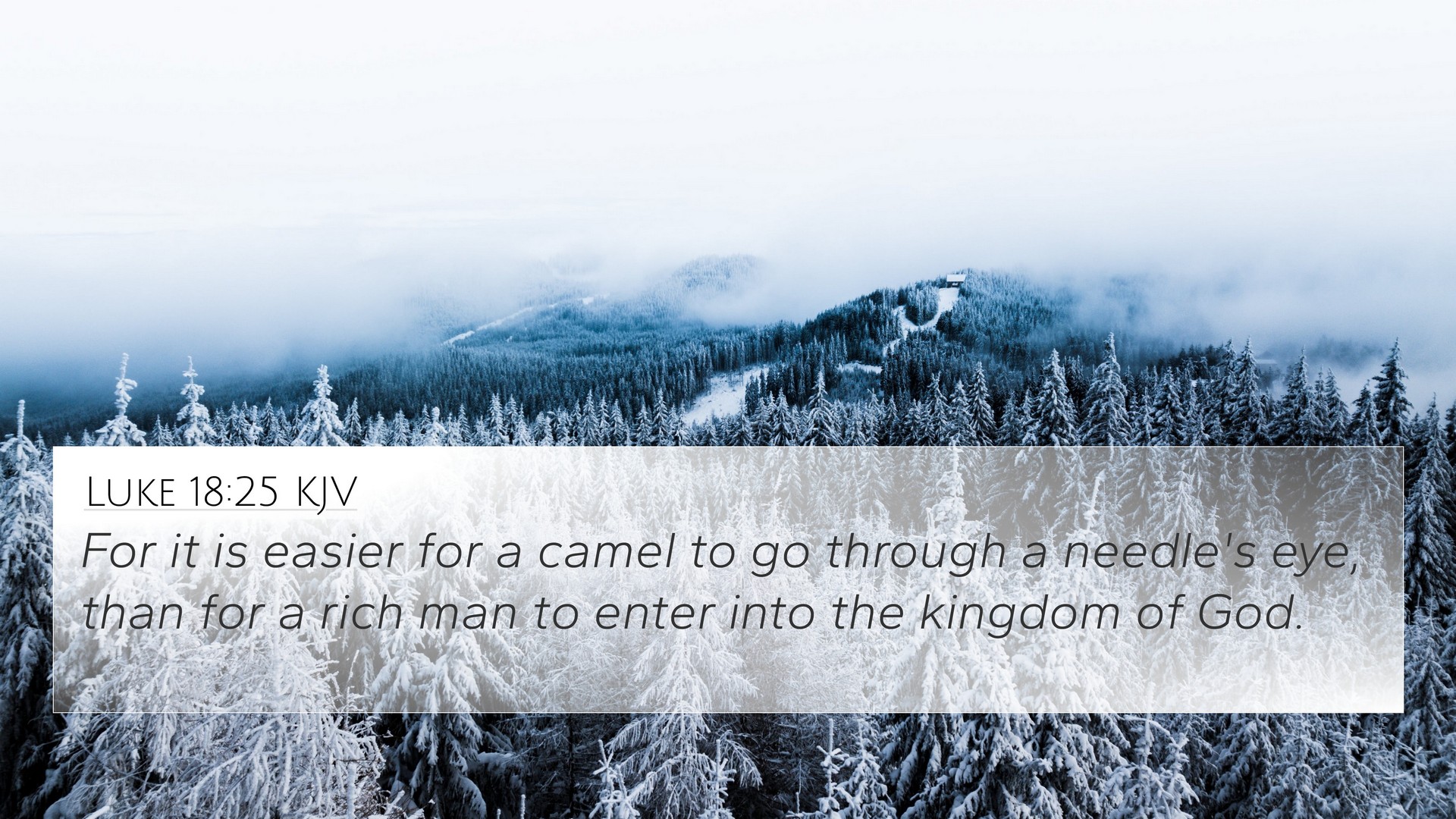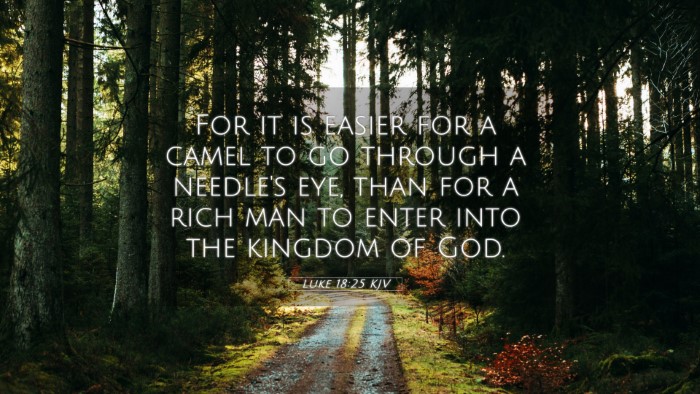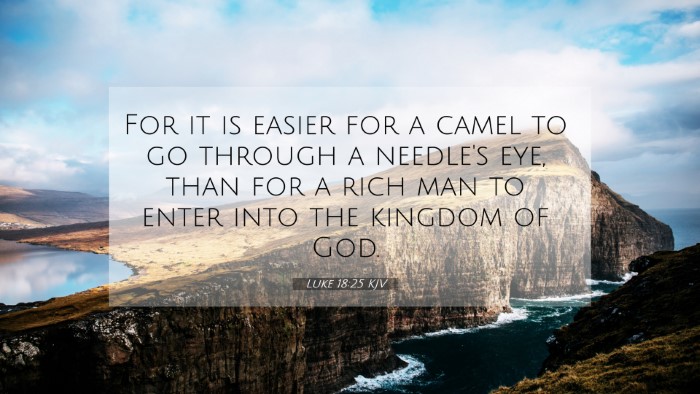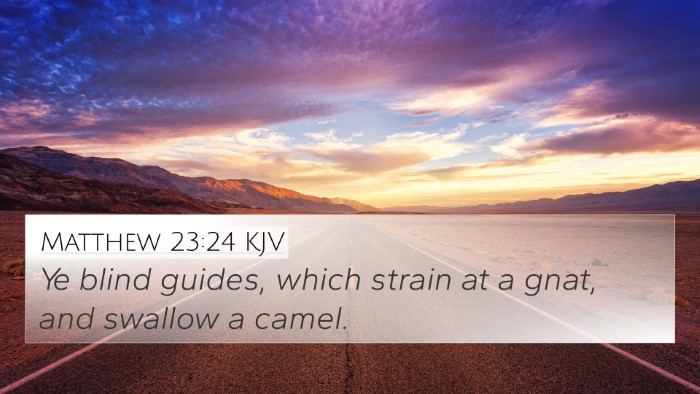Understanding Luke 18:25: A Comprehensive Analysis
Bible Verse: Luke 18:25
"For it is easier for a camel to go through the eye of a needle than for a rich man to enter the kingdom of God."
Verse Meaning and Interpretations
This striking statement by Jesus highlights the difficulties faced by those preoccupied with wealth in their quest for salvation. Public domain commentaries by esteemed theologians provide vital insight into its deeper meaning.
Insights from Matthew Henry
Matthew Henry emphasizes the challenge riches create in one's spiritual journey. He notes that those who are wealthy often become complacent or distracted by their material possessions, which can lead them away from God. Henry underlines the idea that while wealth itself is not inherently evil, the love of wealth can coexist with a heart hardened against divine truths. Henry uses the hyperbolic imagery of a camel passing through a needle's eye to illustrate the incredible improbability of a rich person entering the kingdom of heaven without divine assistance.
Insights from Albert Barnes
Albert Barnes offers a thorough analysis, linking this verse to the broader biblical theme of wealth and spiritual peril. He points out that the metaphor of the camel symbolizes something large and unwieldy, contrasting starkly with the concept of entering through a narrow passage. Barnes discusses that Jesus is not suggesting that it's impossible for the rich to be saved; however, he asserts that they must be cautious of their attachments to wealth and the barriers it creates between them and God. Utilizing biblical cross-references, Barnes connects this verse to passages like Matthew 19:24 and Mark 10:25, reinforcing the point about the challenges wealth presents in spiritual matters.
Insights from Adam Clarke
Adam Clarke approaches the passage by dissecting the cultural context of wealth in biblical times. Clarke mentions how riches were often viewed as a sign of God’s favor, thus complicating perceptions of salvation. He elaborates on the teaching of Jesus, stressing that rich individuals must carefully navigate their blessings and not let them overshadow their need for spiritual humility and reliance on God. Through Clarke’s examination, we understand that Jesus admonishes the rich not just for their possessions but for their tendency to rely on earthly security rather than heavenly grace.
Cross-References and Thematic Connections
This verse finds connections with various other scriptural passages, indicating its vital place within biblical teachings about wealth and spirituality. Here are key references:
- Matthew 19:24: "And again I say to you, it is easier for a camel to go through the eye of a needle than for a rich man to enter the kingdom of God."
- Mark 10:25: "It is easier for a camel to go through a needle's eye than for a rich man to enter into the kingdom of God."
- Luke 16:19-31: The parable of the rich man and Lazarus illustrates the fate of the rich when they overlook spiritual needs.
- 1 Timothy 6:9-10: Paul warns that those who desire to be rich fall into temptation and snares.
- James 5:1-3: A prophetic warning against the rich who exploit their wealth at the cost of righteousness.
- Matthew 6:19-21: "Do not lay up for yourselves treasures on earth..." A challenge to focus on heavenly over earthly treasures.
- Proverbs 11:28: "He who trusts in his riches will fall..." A caution about the reliance on material wealth.
- Psalm 62:10: "If riches increase, do not set your heart on them." Encouragement to keep priorities right regarding wealth.
Thematic Reflections
The overarching theme of Luke 18:25 resonates with multiple ideas found throughout the Scriptures. It speaks not only to the inherent challenges of wealth in one's spiritual life but also to the necessity of divine intervention for salvation. The comparisons of material wealth with spiritual riches highlight the transformative nature of faith and dependence upon God.
Tools for Deeper Study
For a more in-depth understanding of this verse and its connections to other biblical texts, consider employing the following tools:
- Bible Concordance: Utilize a concordance to cross-reference key terms and find related verses efficiently.
- Bible Cross-Reference Guide: Use guides that provide thematic and verse-by-verse cross-references to enhance study.
- Comprehensive Bible Cross-Reference Materials: Resources that compile extensive connections across biblical passages.
Interpreting Through Cross-References
Understanding Luke 18:25 through the lens of its cross-references illuminates the scripture’s broader narrative. Each reference offers unique perspectives, underscoring the perpetual tension between materialism and spiritual depth. For scholars and laypeople alike, identifying these connections aids in grasping the totality of biblical teaching concerning wealth and the pathway to eternal life.
Conclusion
Luke 18:25 serves as a potent reminder of the spiritual implications of wealth. By synthesizing insights from various commentators and exploring its interconnected scriptural framework, we gain a richer understanding of its meaning. The challenges of wealth remain relevant today; thus, engaging in cross-referencing Bible study can profoundly enhance our grasp of God’s Word, guiding us toward living in accordance with the values of the kingdom of God.



